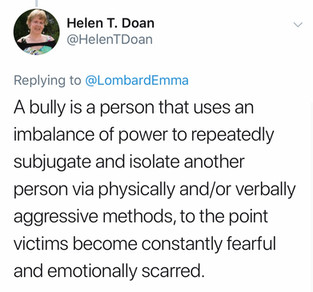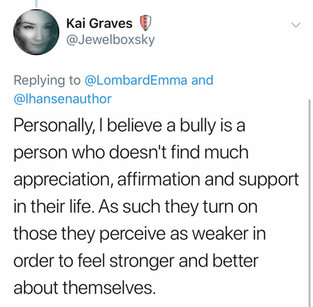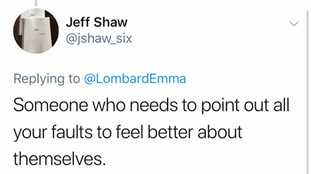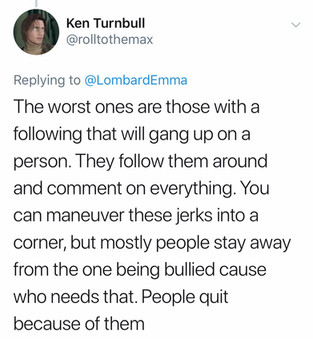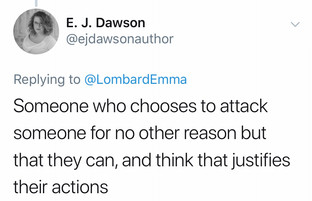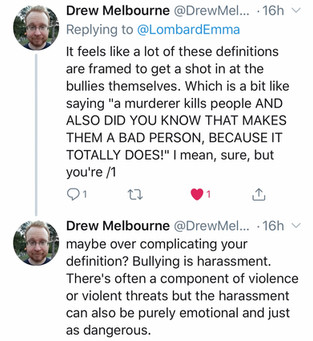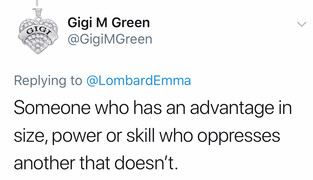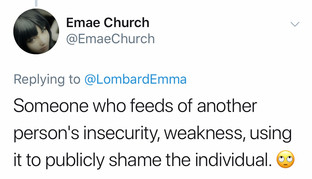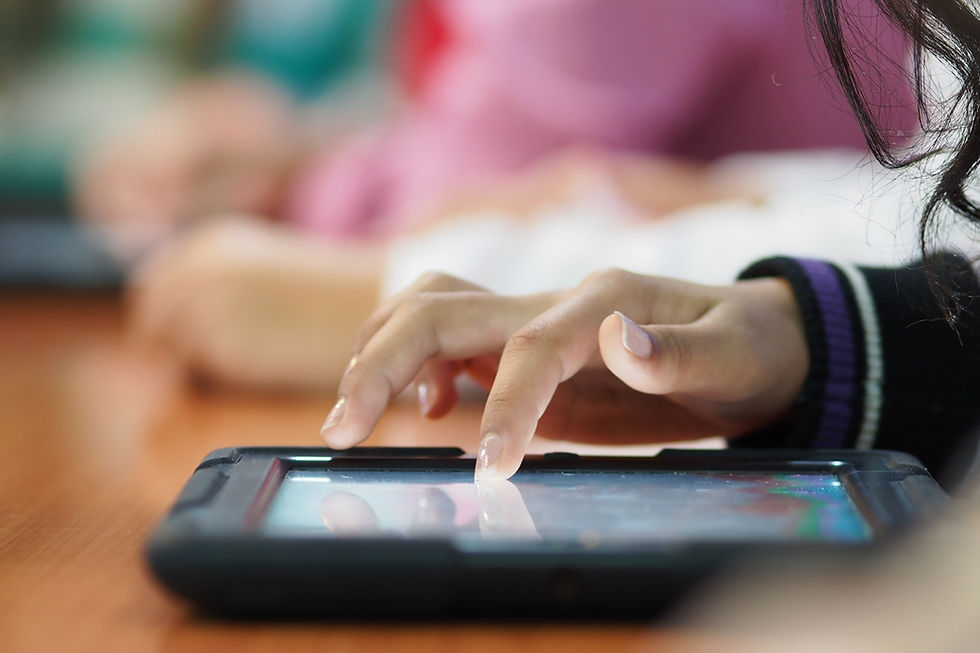Twitter Tips for Newbies: Online Etiquette
- Emma Lombard Author

- May 9, 2019
- 12 min read
Updated: Aug 25, 2020

Emma’s Twitter Tips for Newbies Series:
Part 1 - Twitter Tips for Newbies
Part 2 - More Twitter Tips for Newbies
Part 3 - Even More Twitter Tips for Newbies
Part 4 - Twitter Tips for Newbies: Online Etiquette - this blog post
Unfortunately, there are no hard and fast ‘Written Rules’ for Twitter etiquette. Consequently, people behave on Twitter in an assortment of ways. However, there are some common decencies that come into play on Twitter that are the same as in real life.

Basic Manners
Use please and thank-you at every opportunity. Even if you are short on character space, you can always use the abbreviations pls and thx.
Inclusivity Awareness
As we know, Twitter can be an awesome place to come and play with jokes, banter and gifs a plenty. Did you know that not everyone can join in equally on Twitter? For example, folks who are blind or visually impaired. However, here are a few super-simple things you can set up on your Twitter account that makes life easier and more inclusive for folks who use electronic readers.
Capitalise Hashtags
Make sure you capitalise the first letter of each word in hashtags so that screen reader software reads out each word separately. It also makes them #EasierToRead!
Turn on Image Descriptions
Make sure ‘Image Descriptions’ is turned on in Twitter settings.
Always add a written description to photos you upload.
To turn on ‘Image Descriptions’ on Twitter:
Click your profile image
Click ‘Settings and Privacy’
Click ‘Accessibility’
Under ‘Vision’, turn on ‘Compose image descriptions’
Avoid Special Characters in Tweets
Tweets that appear to have special font are actually mathematical characters, as highlighted by this Twitter post by software guru Kent C. Dodds (@kentcdodds).

Original Tweet reads: You think it’s cute to write your tweets and usernames this way. But have you listened to what is sounds like with assistive technologies like VoiceOver? Listen here.
What About Using Emojis?
Emojis are read out by screen readers, though sometimes the long descriptions are frustrating for listeners. This great blog from Veronica Lewis, vision impairment and assistive technology
blogger (@veron4ica), elaborates the best way to use emojis in your tweets: How Do People with Vision Impairments Use Emoji?
Shucks! I’m guilty of getting a bit carried away with my emojis sometimes! I shall be more mindful going forth.

Use Hashtags Appropriately
While we’re chatting about hashtags, there are a whole hoard of hashtags floating around online. The point of hashtags is to help your posts gain traction and to be easily searchable on Twitter.
But there are some people out there who deliberately use trending hashtags in their posts just because it will gain them traction with Twitter analytics – but this isn’t cool guys. It makes you look silly – like using #PitMad, which is to do with pitching manuscripts to agents and editors in the #WritingCommunity, in your random posts just because it’s the trending hashtag of the day. It also makes you appear like a desperate attention seeker and it floods the Twitterverse with unnecessary hashtags that make it hard for agents and editors to find the real pitches.
Or you could just be misusing hashtags out of complete ignorance, which was yet another of my rookie mistakes, like using the Wednesday blogging hashtag (#wwwBlogs) when I was posting a blog on Sunday! Doh!
I rallied the troops in the #WritingCommunity to share their favourite hashtags, describe what they mean and when they should be used. I received so many wonderful suggestions and I’ve pulled together a few here that pertain mainly to Twitter’s #WritingCommunity.
Hashtags for the Writing Community
#5AmWritersClub – online writing sprints with folks who are awake at 5am
#7AmWritersClub – online writing sprints with folks who are awake at 7am
#AmEditing – when talking about editing
#AmNotWriting – for those moments of procrastination or frustration with your writing
#AmQuerying – when talking about your manuscript (MS) being queried with agents or editors
#AmWriting – when talking about your own current work in progress (WIP) + your genre
#IWSG – Insecure Writer’s Support Group - for folks who need a little more encouragement
#QueryTip – search this hashtag for useful info from agents and editors
#TurtleWriters – a community for slow writers offering support, encouragement and fun
#vss365 – used when writing very short stories on Twitter
#WIP – means work in progress, when talking about your current project
#WriteLGBTQ – used when talking about writing LGBTQ WIPs
#WriterLift – used when tagging and promoting other writers
#WritersLife – when doing other writer-related things that don’t involve writing
#WriteTip – for writing tips
#WritingCommunity – when engaging with other writers / when talking about writing
Hashtags for Pitching to Agents and Editors
(ONLY to be used when windows for submissions are open, and ONLY to be used by those actually pitching)
#PitMad – writers tweet a pitch for their completed, polished, unpublished manuscripts. Agents and editors make requests by liking/favoriting the tweeted pitch.
#RevPit – Twitter contest where querying authors can win feedback and edits on their full manuscripts from professional editors.
#DVPit – Twitter pitching event for marginalised authors and illustrators.
Hashtags for the Independently Published Author Community
#IndieAuthor – when promoting own indie book
#ReviewIndieBooks – when reviewing other indie books
#ReadIndie – when reading other indie books
Hashtags for the Blogging Community
#MondayBlogs - for writing blogs only - NOT book promotion
#wwwBlogs – Women Writers Wednesday Blogs
#BloggersTribe – used when posting blogs on Wednesdays, Fridays and Sundays
Hashtags for the Poetry Community
Trending Hashtags
To see which hashtags are trending right now across all platforms, click HERE.
(Note: the Best Hashtags site doesn’t elaborate when or how to use the hashtags).
For other acronyms floating around in the #WritingCommunity, see my other blog, Even More Twitter Tips for Newbies.

Retweet vs Retweet with Comment
See Misusing ‘Retweet with Comment’ in Even More Twitter Tips for Newbies.
Disclaimer: For the ease of explaining what I mean, I have created our mate, Poor Joe Blogs, as a fictional character to use in my examples and whose fictional Twitter handle (@PoorJoeBlogs) at the time of writing does not exist.
Retweet vs Retweet with Comment - Twitter Analytics
When you Retweet Poor Joe Blogs’ post, Twitter analytics gives Poor Joe Blogs the credit and the exposure for all the likes, retweets and comments on that post
When you Retweet with Comment, even if you tag Poor Joe Blogs in your post (which you should do to credit Poor Joe Blogs as the original poster), Twitter analytics gives YOU the credit and exposure for any like, retweets or comments on your post – but NOT Poor Joe Blogs.
Some folks on Twitter feel that a Retweet with Comment is actually rude and tantamount to theft (because their Twitter analytics are being taken from them) – it can be a bit of a hotspot on Twitter.

Cyberbullying
Flaming
Essentially, flaming is the practice of being nasty and insulting online and can involve two or more parties who gang up against another individual and verbally attack them online.
Here’s good old Wikipedia to the rescue if you want to know more about flaming.
Critical Tweet vs Subtweet
A critical tweet is obviously not intended to be nice, as the name implies. It galls me to include these awful examples in this blog on etiquette but I feel it’s important for folks to see what’s NOT acceptable as well as what is. A critical tweet usually tags the person and adds a criticism or slanderous comment about them.
Example (actually tweeted to me once but now assigned to our mate, Poor Joe Blogs):
@PoorJoeBlogs Attention seeker!
This critical tweet promptly earned that person a hard block! No engagement. No challenge. Just a hard block.
Subtweeting is essentially Twitter’s version of gossiping about a person without them knowing because they aren’t tagged. I’m not here to lecture on the divisive nature of gossiping, except I will add that I believe it to be a form of bullying and this is a huge no-no in my books!
Subtweeting can happen in two ways. Someone can post their nasty comment about our mate, Poor Joe Blogs:
directly on their feed without adding Poor Joe Blogs’ @ handle to tag him, or
using Retweet with Comment without adding Poor Joe Blogs’ @ handle to tag him (this also happened to me – with a different nasty comment to the one above – it did not show in my Mentions but I saw it in my All Notifications feed)
Examples (fabrications based on the critical tweet above):
I think Poor Joe Blogs [with no @ handle so Poor Joe Blogs can’t see this tweet] is just an attention seeker. Don’t bother following him.
There’s a guy I follow on Twitter who is such an attention seeker. He’s only after the numbers!
Dude, you clearly love the attention and you’re only here to grow your numbers but I’m onto you as are my followers!
While subtweeting is supposed to be done sneakily so the person being gossiped about doesn’t see what is being said, as is a prime example in my case, information has a way of coming around to people eventually. I just soft blocked and moved on in this instance.
More of My Own Rookie Mistakes
Critical tweets and subtweets incite other followers to bay for blood, especially if those followers are die-hard fans of the person who posted the nasty tweet. Too many people take the word of an ‘influencer’ online without checking out the details for themselves – including me. I made this exact rookie mistake at the very start of my Twitter journey in the #WritingCommunity and I am now blocked by a couple of writers – much to my huge regret – who I blocked first based on some divisive subtweets that were flying around Twitter.
I was a Twitter newbie and scared to death of social media and when someone with a huge following suddenly followed me, I felt like I could safely tuck myself under their wing. I wrongly assumed that they got their large following for being a nice and that their followers were nice too. But people’s true colours will eventually surface.
This is why I’m ALWAYS harping on about SCREEN YOUR FOLLOWERS! You’ll spot nasty comments in their Tweets and Replies and you can avoid following them and even pre-emptively soft block them to make them stop following you.
What if Someone I Follow is Being Mean to Me or Someone Else?
There are so many wonderful resources out there written by professionals about how you can deal with online bullying. I’m no professional. This is just my two cents’ worth on the way I deal with mean people on Twitter (not hardcore criminal stuff).
Stop Engaging Immediately
The minute a conversation goes south, I don’t react or add any more to it. I walk away and shut down social media for a bit to gather myself. I don’t know about you, but I get all wobbly and shaky in confrontational situations. Have a cup of tea. Go talk to a real person. Hug your puppy. Whatever it takes to help you settle down and feel better.
Unfollow or Block the Poster
If you’re afraid the poster will see you’ve unfollowed them and that it will add fuel to their fire, then soft block them, which stops you following them and them following you. To soft block someone, block them and immediately unblock them – this breaks all links between you both, though you will still both be able to see each other in mutual followers’ posts. Cutting the ties of their following you also prevents any accusations of you following and unfollowing for the sake of falsely inflating your numbers (another hotspot on Twitter).
Or hard block them to permanently end seeing them online.
I’ve seen plenty of subtweets mocking people who have blocked someone online – some people see this as a feather in their cap and some use it to incite their fan followers even more – they make it a victory that they won because you ran away. None of this matters. You need to get out of that toxic loop as quickly as you can. It won’t be long before they move onto their next victim and you won’t even be a blip on their radar.
Take care if you see someone being bullied online and you go into defend them that you don’t end up being turned on by everyone else in the process.
Reach Out for Help
If you know the person being bullied, perhaps you can DM (Direct Message) them – only if you already have a private DM agreement in place – to offer them a quick word of support and encourage them to stop engaging. It is too easy for people to keep reacting when tempers flare.
It’s also very scary and lonely when a bunch of people suddenly turn on you because you don’t know who to trust anymore or who turn to. If you have a trusted friend on Twitter, reach out to them privately (not in a public rant) to debrief and/or ask for help. Sometimes another perspective can help.
Report the Comments to Twitter
If you feel the perpetrator’s comments are derogatory or inflammatory enough to report them to Twitter, then do it. Twitter will then process your report and act accordingly. Though, keep in mind, I’ve seen many cries in the Twitterverse about how someone reported something that they thought was awful but Twitter let it stand.
I personally have never reported anyone on Twitter (yet). If you believe what the person is saying is criminal, then please don’t hesitate to go to the appropriate authorities in your country for help.

What Twitter’s #WritingCommunity Has to Say About Bullying
I put out a call in Twitter’s #WritingCommunity for folks to share their definition of bullying because, let’s face it guys, bullying is extremely personal to each and every one of us.
Here are some different, though no less disturbing, perspectives on bullying

Jennifer Nichole (@JeNicholeWrites), had this to say in a tweet thread:
Okay, so when I tweeted requesting people share their thoughts on what a bully was/did I was mostly hoping to open peoples’ eyes. I have seen some bullying here in the #writingcommunity, as well as other social media forums and I began to realize that these people are not all professionals (some of the popular ones with large followings). They are just learning and becoming popular via their content and personalities, among other things.
I'm sure they all have different reasons for their social media presence, but what they all have in common is that their followers are for the most part pretty supportive, loyal. I began to notice that some of them don't always handle things the best, they have charisma but not all of the best coping skills, and when you have such a large following and interact with them to a degree, you really should attain some, because these people look up to you, listen to you, "follow" you; you are in essence, a role model and to an extent have power over many opinions and situations even. You have the potential to entertain, inspire, lift up and benefit others, but there is another side to this, you also have the power to hurt, deflate and even (intentionally or not) bully.
Large followings means those eyes are looking to the followed one way or another and when they see the person(s) they have bonded over time with, at odds with someone, they can and they WILL form little/large mob style attacks. They will support the one they follow regardless of the truth and they will become abusive. Not everyone will, because some people have very strong minds and will think for themselves, but some will. This in its self is bullying. There are YOUTUBERS who take people they want to criticize or humiliate and put them up for display to humiliate, and their followers will join in (I've seen it, it's terrible and shitty and sometimes even deadly).
Now, when I started seeing here, in the #writingcommunity, I was appalled. Seeing comments like: "I'm afraid of you" and "scared of you", whoa. WHOA. Really??? WTF? In the #writingcommunity? That spurred me into action. I am very anti bullying and I will NOT tolerate it. I spoke up and I am not sorry. If bullying is a part of the #writingcommunity and everyone is going to sit back and accept it, then I don't belong in it, and I would be okay with that because I have integrity and a very strong set of morals. Bullying people is one of the worst human behaviors in my book.
Now, all that said I want to emphasis something: people who aren't bullies in entirety (most aren't, many are) can begin to use bullying tactics. This is what I meant by the newbies to being a social media influence comes in, they don't all have the best dealing skills, though they might have influential skills. Coping with people who annoy them, anger them and otherwise disagree with them, is not their bag. They sometimes use their following to punish, ostracize and force people into submission or compliance.
They need to learn how to manage their coping skills and realize this is not only wrong but that there are better ways to manage with the frustrations they face in social media. It might feel fair to them in the moment, it might feel justified, but they need to understand that in the positions they hold, they are no longer one on one dealing or talking to people, they have an audience. It's roughly the difference between a fly swatter and a hatchet (I can't remember the saying exactly but hopefully you get the reference). Everything they do is that much bigger of a deal, that much more harmful, and if they can't conceptualize this reasoning, they don't belong in the influential place they are. I could go on, but I hope my point here is clear. I want the #writingcommunity to be a safe place.

Making Our #WritingCommunity A Safe Place
The last part of this blog has not been fun to write. In fact, it’s made me feel quite icky. But it has too important a message behind it for me not to put the warning signs out there. If ever you’ve witnessed any of the above behaviour in Twitter’s #WritingCommunity (whether it is intentional by the perpetrator or not), it’s okay to take action and unfollow, soft block or hard block the people behind the uproar.
I don’t know about you guys, but I don’t want that kind of behaviour popping up on my feed. Let’s make the #WritingCommunity a safe place for all.
Additional Helpful Resources on Cyberbullying
ReachOut.com: 5 Strategies for Dealing with Cyberbullying
Talk Space: 7 Ways to Deal with Cyberbullying
Quick disclaimer: I’m no cyber expert or psychologist or the Twitter police, I’m just a regular Tweeter like you guys. This information is based on my personal experience online and is not meant as professional advice. If you’re feeling threatened online, please contact the appropriate authorities in your country.
Subscribe to Emma Lombard's newsletter for book publication news and swag giveaways.





